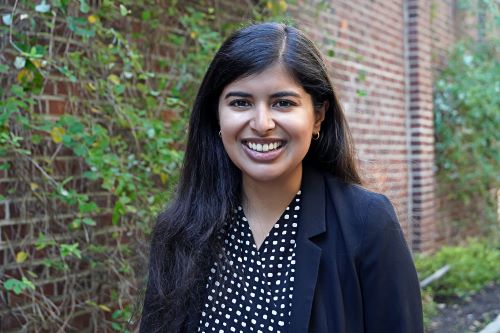Enter your email to receive the CareQuest newsletter:
November 13, 2023
Amanpreet Kaur first encountered the concept of health literacy — defined as the ability to find, understand, and use information and services to inform health-related decisions and actions — as a young college graduate. Although she had never heard the term before, it instantly made sense to her.
“As a child of immigrant parents, I have been helping the adults in my life navigate life for as long as I can remember,” she says. “Through my childhood experiences as an interpreter and cultural broker, I was exposed to a variety of health topics, which helped me reduce personal stigma around topics that would also come up in health education coursework at school.”

Now, health literacy is at the heart of her work. After earning her Master of Library and Information Science degree from Rutgers University, she joined the Leon Levy Dental Medicine Library at the University of Pennsylvania as its inaugural health literacy librarian in 2022. In February 2023, Kaur and a colleague launched the Health Literacy Study Club, a virtual discussion series facilitated by dental students.
The club reads and discusses texts related to health literacy and patient education, with a particular focus on oral health and dental medicine. Participation is open to anyone who is interested; some dentists who practice overseas attend. The group also includes individuals outside of the oral health field, leading to fruitful conversations.
A key theme of the club is engaging with patients outside the health care setting, a focus of a recent CareQuest Institute webinar, Connecting to the Community: A Provider’s Work Beyond the Dental Chair. Kaur attended the webinar and pointed to it as a source of ideas for future Health Literacy Study Club discussions.
Below, Kaur shares more about the club and what she hopes it can accomplish.
When did you start the Health Literacy Study Club? What was the impetus?
In July 2022, Laurel Graham, the head of the Leon Levy Dental Medicine Library, introduced me to faculty and staff in the Community Health Oral Division. During this meeting, Dr. Joan Gluch, the division chief, brainstormed the idea of forming a journal club to further engage dental students with health literacy content outside of class. The idea intrigued me because I had previously led health literacy–related article discussions.
While there are book, journal, and discussion clubs and groups at the University of Pennsylvania for a wide assortment of personal and academic interests, I did not know of a health literacy–focused one.
In addition, when I shared information with the Institute of Healthcare Advancement’s (IHA) Health Literacy Solutions Center, I learned that this was a novel concept, which led to a poster presentation at the IHA Virtual Health Literacy Conference earlier this year.

How do you choose which texts to discuss? Can you share a few?
Dr. Gluch and I wanted to discuss both foundational and emerging research and best practices about health literacy and patient education, so we launched the club in February 2023 with a foundational article and a newer article to start the discussion. From March through May 2023, participants suggested articles and topics to discuss. Starting in September 2023, we have invited Penn Dental students to facilitate discussions using topics and articles of their choice.
Articles that we have discussed thus far include:
- “Oral Health Literacy Levels Among a Low-Income WIC Population”
- “Is the Information About Orthodontics on YouTube and TikTok Reliable for the Oral Health of the Public? A Cross Sectional Comparative Study”
- “The Evaluation of Chatbot as a Tool for Health Literacy Education Among Undergraduate Students”
In November, we will be discussing an article titled, “Barriers and Facilitators to Dental Care Access Among Asylum Seekers and Refugees in Highly Developed Countries: A Systematic Review.”
Can you describe the mix of people who participate and what draws them in?
In the registration list, there is usually a mix of Penn Dental faculty, staff, and students; students and staff from other parts of the university or adjacent health care system; and people from outside of Penn. We regularly have public health professionals from across the country along with dentists practicing overseas. We promote the Health Literacy Study Club via social media and via the Health Literacy Solutions Center. We are always looking for more participants and perspectives.
As of September 2023, the Penn Dental Medicine’s Continuing Education Office is offering continuing education (CE) credits for participants and facilitators of the Health Literacy Study Club.
Will the club stay virtual?
We originally planned to start virtually and move to in-person or hybrid as the weather got warmer. However, we stayed virtual to accommodate participation from multiple time zones.
What is the ultimate goal — how do you hope the club will eventually benefit patients?
The original idea of the Health Literacy Study Club was to further engage dental students with health literacy content outside of class, and it turns out that there are many groups of people around the world who want to discuss oral health literacy issues and learn from each other.
I hope that the participants of the Health Literacy Study Club will go on to improve their interactions with the patients and loved ones. For me, it’s given me some thought about what I can ask my hygienist, dentist, and orthodontist during my next appointment.
What are your plans for the club going forward?
We are hosting two more Health Literacy Study Club meetings this fall. Please join us on Zoom for either or both of these discussions.
- Mon 11/27 at 12 p.m. Eastern: https://libcal.library.upenn.edu/calendar/wicshops/htsc
- Fri 12/15 at 12 p.m. Eastern: https://libcal.library.upenn.edu/calendar/wicshops/hlsc